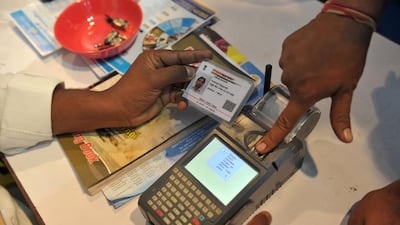When Ravi Mundoli went to renew his driving licence in Visakhapatnam, an official notice informed him that he could not do so without an Aadhaar card.
More than 900 million people have been enrolled in the Indian government’s Aadhaar programme — a biometric system with a unique 12-digit number, designed to make it easier for Indians to prove their identity and register for services.
The Aadhaar (foundation) system captures fingerprints and iris scans, and is already the world’s largest biometric database. Any resident of India, regardless of nationality, can apply for an Aadhaar card free of charge.
But in October 2015, India’s supreme court instructed the government not to make Aadhaar a compulsory pre-requisite to access any state services.
Which is why the traffic bureau notice surprised Mr Mundoli, a software entrepreneur. As it turned out, the notice was either poorly phrased or poorly implemented.
Mr Mundoli managed to renew his license in the end, but he had to queue up at eight counters, whereas with an Aadhaar card, he would have only needed to visit four.
“It feels like it is not-so-slowly creeping into every facet of life, mostly in a way which respects the letter of the supreme court judgement but not the spirit,” Mr Mundoli said. “The machinery is now increasingly designed to be slow as molasses if you don’t have one.”
The government has not said that every resident of India must have an Aadhaar card. But in violation of the court order, various ministries have either made Aadhaar compulsory for particular services or, as at the traffic bureau, made it difficult to access these services without Aadhaar.
The list of such instances is long and growing.
As of last Thursday, anyone booking train tickets online cannot do so without an Aadhaar number.
On Saturday, the government said that more than 100 million children who receive free school lunches — a scheme designed to persuade poor parents to send their children to school — will need Aadhaar cards to receive meals.
But on Tuesday, facing heavy criticism, the government retracted this particular order. However, the education ministry said that children would still need to be enrolled for Aadhaar, even if their meal benefits did not stop in the interim.
Children aged six to 14 who receive free textbooks and uniforms under India’s Right to Education Act will need to apply for their Aadhaar documentation by the end of June, while a nationwide pension scheme now requires its 25 million members to submit their Aadhaar details.
At least a dozen other social welfare, health and education schemes have also made it compulsory for applicants to produce their Aadhaar details.
Civil rights groups are concerned about the linking of Aadhaar to public services.
“It’s designed to cause civil death — the loss of all or almost all civil rights [of] a person,” said Gopal Krishna of the Citizens Forum for Civil Liberties, who has long advocated against Aadhaar.
He argued that its extensive database can assist in the violation of a citizen’s right to privacy. Other civil rights groups have petitioned the supreme court, arguing that Aadhaar and its implementation are unconstitutional.
In October 2015, the court decided that it needed a five-judge bench to hear and rule upon these petitions. But due to the supreme court’s work backlog, there has been a delay in forming the bench, Dr Krishna said.
Consequently, no entity currently exists to acknowledge violations of the court order which ruled that Aadhaar should not become mandatory.
The Aadhaar programme collects sensitive personal information such as biometrics, contact details and date of birth, prompting fears of data privacy and data security.
But Rahul Matthan, a Bangalore-based partner at a law firm called Trilegal, who has consulted with government agencies, said Aadhaar’s data security is very robust.
Mr Matthan pointed out that millions of people in India lack a reliable form of identification, and that Aadhaar was a well-designed solution to this problem.
“Aadhaar itself in my view is not dangerous,” he said. “But to avoid bringing in identity theft and other problems, it’s important for us to have a really solid privacy law also.”
The government permits private firms — mobile telephony companies or insurance providers, for instance — to use Aadhaar to verify identity.
“So it’s possible for someone in the telecom company to know that this guy, with this Aadhaar number, is speaking on the phone for this many minutes,” Mr Matthan said. “And that kind of information about you will exist in other databases of private companies also. Theoretically, it’s possible to build quite a large profile of a person with access to these databases. That’s the real risk. That’s what a privacy law should target.”
As he had not seen the text of the orders that made Aadhaar compulsory for railway ticket bookings or other services, Mr Matthan said he was unwilling to comment on their legality.
“But in general, the supreme court order is there — you can’t make it mandatory,” he said. “Any requirement to make it mandatory will, at some point, be set aside by virtue of that order.”
ssubramanian@thenational.ae
* An earlier version of the story said Ravi Mundoli renewed his licence in Chennai. In fact, he did so in Visakhapatnam.

